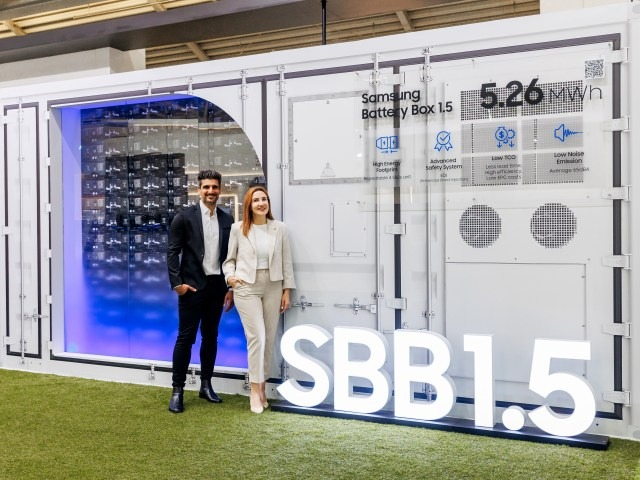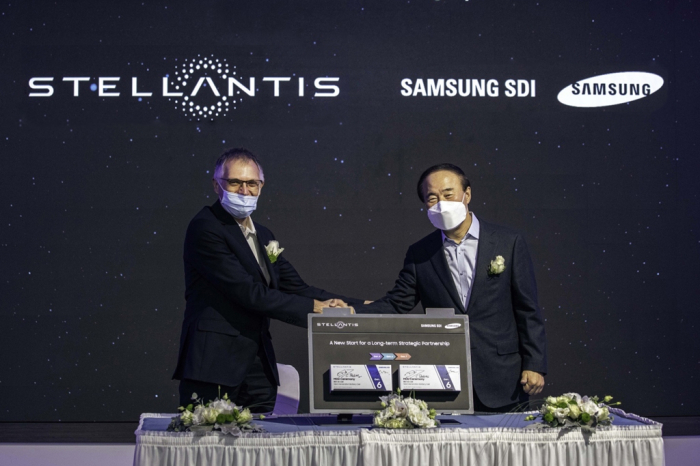Batteries
Samsung SDI to ink $726 mn ESS deal with NextEra Energy
Samsung SDI shares hit 2-week high; the South Korean battery maker may install ESS battery lines at planned US factories
By Jul 05, 2024 (Gmt+09:00)
3
Min read
Most Read
NPS to cut global stocks under GP management, up its direct control


Korean PE funds shrink in 2023 for first time in 7 years


S.Korea's LS Materials set to boost earnings ahead of IPO process


AI to drive Mirae Asset's next-phase growth: chairman


Cosmax mulls building cosmetics factory in Latin America



Samsung SDI Co., the worldŌĆÖs sixth-largest electric vehicle cell maker, is set to provide batteries for energy storage systems (ESS) to NextEra Energy Inc., a major US clean energy company, in a 1 trillion won ($726 million) deal.
The South Korean battery maker is expected to secure recovery momentum in the ESS market amid sustained weakness in the EV sector on sluggish demand while aiming to bite into the market share of major Chinese players hurt by the US governmentŌĆÖs policies to rein in their expansion.
Samsung SDI is in final talks with NextEra Energy to supply 6.3 gigawatt hours (GWh) of ESS batteries, about 11.5% of the total ESG capacity of 55 GWh in North America last year, industry sources in Seoul said on Thursday.
The potential supply to NextEra Energy is expected to help Samsung SDI win deals from other companies, according to the sources.
The news pushed up Samsung SDIŌĆÖs stock price by as much as 4.1% to 390,000 won, the highest since June 21 in the South Korean stock market on Friday morning as the order would be the largest deal won by a domestic company.
Samsung SDI plans to sell the Samsung Battery Box (SBB) 1.5 model encased with high-nickel NCA, or nickel-cobalt-aluminum, cells and modules stacked on racks, according to the sources. The SBB 1.5 loads 5.26 megawatt hours (MWh) per unit, increasing the energy density by 37% from its predecessor.
SURGING DEMAND
Demand for ESS batteries is predicted to jump as countries worldwide rush to install solar power facilities, which need storage systems as their electricity generation varies depending on the weather.
Samsung SDI had led the ESS battery sector with a market share of 50% by 2018. The company failed to maintain the throne as Chinese players actively expanded their presence with cheaper and safer lithium iron phosphate (LFP) batteries.
The unit of South KoreaŌĆÖs largest conglomerate Samsung Group made up only 4.9% of the global ESS battery market last year, far behind the 40% of the worldŌĆÖs top battery maker Contemporary Amperex Technology Co. (CATL), the 11.9% of the No. 2 BYD Co. and the 11.4% of Eve Energy Co.
Those Chinese companies are likely to lose steam, especially in the US, given the intensifying trade war between the worldŌĆÖs two largest economies.
ŌĆ£The global ESS market is dominated by Chinese makers with low-cost LFP batteries, but the US plans to ramp up tariffs on Chinese products to 25% from 7.5% in 2026, which will increase demand for Korean products,ŌĆØ said an industry source in Seoul. ŌĆ£The ESS is becoming a savior of Korean battery makers dampened by sluggish EV demand.ŌĆØ
EXPANSION IN THE US
Samsung SDI has been targeting the US ESS market as falling solar panel prices have powered a photovoltaics boom in the country. Domestic electricity consumption also increased, especially in cities where Big Tech companies are concentrated, due to the growing artificial intelligence industry.
The US ESS market was forecast to more than double to $18.7 billion by 2030 from an estimated $7.9 billion this year, according to research firm Global Market Insights Inc.
Samsung SDI is predicted to install ESS battery production lines at its planned US cell plants as it is scheduled to manufacture LFP batteries from 2026 with an aim to take on its Chinese rivals in the low-cost market.

LG Energy Solution Ltd., the worldŌĆÖs third-largest EV battery maker, is also set to expand the ESS cell business to recover earnings dampened by sluggish EV sales of its key customers such as Tesla Inc. and General Motor Co.
The South Korean company is converting some production lines for EV batteries at its plants in Michigan and Nanjing, Jiangsu, to those for ESS cells.
The move allowed LG Energy to cut costs and times, compared with establishing new ESS battery manufacturing lines, while increasing runs at the existing plants.
The company was estimated to have logged an operating profit of some 20 billion won from the ESS battery business last year, swinging from a loss of 200 billion won in 2022, industry sources said.
Samsung SDI is expected to report a profit of up to 43 billion won from the sector, according to the sources.
Write to Hyung-Kyu Kim and Woo-Sub Kim at khk@hankyung.com
┬Ā
Jongwoo Cheon edited this article.
More to Read
-
 BatteriesLG Energy halts Arizona battery plant building on weak EV sector
BatteriesLG Energy halts Arizona battery plant building on weak EV sectorJun 28, 2024 (Gmt+09:00)
2 Min read -
 BatteriesLG Energy wins estimated $1 bn ESS battery deal from Qcells
BatteriesLG Energy wins estimated $1 bn ESS battery deal from QcellsMay 17, 2024 (Gmt+09:00)
2 Min read -
 BatteriesSamsung SDI, Stellantis to build 2nd US EV battery plant in Indiana
BatteriesSamsung SDI, Stellantis to build 2nd US EV battery plant in IndianaOct 12, 2023 (Gmt+09:00)
1 Min read -
 BatteriesSamsung SDI to invest $2 bn to build 2nd US battery plant with Stellantis
BatteriesSamsung SDI to invest $2 bn to build 2nd US battery plant with StellantisSep 27, 2023 (Gmt+09:00)
2 Min read
Comment 0
LOG IN


